Articles
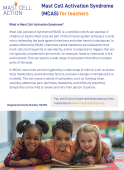
MCAS for teachers
This pack can be used to share information about MCAS with teachers and other care-givers.
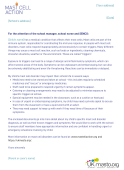
Letter for schools
Use this letter template along with the Freedom kit to share your child's needs with their school or childcare provider
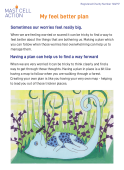
My Feel better plan
When we are feeling worried or scared it can be tricky to find a way to feel better about the things that are bothering us. Download and complete this plan which you can follow when those worries feel overwhelming.
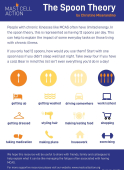
The Spoon Theory
People with chronic illnesses like MCAS often have limited energy. In the spoon theory, by Christine Miserandino, this is represented as having 12 spoons per day. This can help to explain the impact of some everyday tasks on those living with chronic illness.
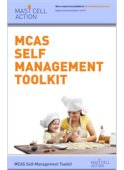
MCAS Self-management toolkit
This toolkit contains information about substances in food and in the environment that can affect mast cell activity or trigger MCAS symptoms. It also includes practical advice to help you understand and avoid these triggers, as needed.
MCAS symptom log
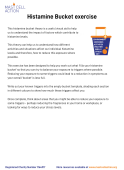
The histamine bucket exercise
This histamine bucket is a useful visual aid in trying to understand the impact of factors contributing to histamine levels.
Ask Ingrid app
A free app developed by the Food Intolerance Network, Australian Society for Public Health. It contains comprehensive information about foods containing histamine, sorbitol, gluten, lactose, fructose and FODMAPs.
Baliza.de. Histamine, fructose & co food intolerance app
A smartphone app that provides practical, evidence-based information about foods containing common triggers such as histamine, tyramine, lactose, fructose, sorbitol and fructose.
Monash University FODMAP app
A smartphone app developed by experts at Monash University. Contains detailed information about foods containing FODMAPs as well as a useful symptom tracker feature.

Swiss Interest Group Histamine Intolerance (SIGHI)
SIGHI is an organisation that provides information about histamine-related disorders.
The low histamine chef
Blogs, books and recipes written by the low histamine chef (Yasmina Ykelenstam), a health journalist who has managed her own histamine intolerance for more than 10 years.
Becky's MCAS Journey
An infographic of a patient's experience with MCAS.
Diagnosing MCAS Leaflet
A leaflet discussing diagnostic criteria, biomarker tests and important information for diagnosis.
Mast cell activation symptoms are prevalent in Long-COVID
Weinstock LB, Brook JB, Walters AS, Goris A, Afrin LB, Molderings GJ. Mast cell activation symptoms are prevalent in Long-COVID. Int J Infect Dis. 2021 Nov;112:217-226. doi: 10.1016/j.ijid.2021.09.043. Epub 2021 Sep 23. PMID: 34563706; PMCID: PMC8459548.
Mast Cell Action Brochure _ B&W
Cosegregation of postural orthostatic tachycardia syndrome, hypermobile Ehlers-Danlos syndrome, and mast cell activation syndrome
Vadas P, Guzman J, McGillis L, Mittal N, Walsh S. Cosegregation of postural orthostatic tachycardia syndrome, hypermobile Ehlers-Danlos syndrome, and mast cell activation syndrome. Ann Allergy Asthma Immunol. 2020;125(6):719-720. doi:10.1016/j.anai.2020.08.015
The relationship between mast cell activation syndrome, postural tachycardia syndrome and Ehlers-Danlos syndrome
Wang E, Ganti T, Vaou E, Hohler A. The relationship between mast cell activation syndrome, postural tachycardia syndrome, and Ehlers-Danlos syndrome. Allergy Asthma Proc. 2021;42(3):243-246. doi:10.2500/aap.2021.42.210022
Mast cell activation syndromes and anaphylaxis: Multiple diseases part of the same spectrum
González-de-Olano D, Matito A, Alvarez-Twose I. Mast cell activation syndromes and anaphylaxis: Multiple diseases part of the same spectrum. Ann Allergy Asthma Immunol. 2020;124(2):143-145.e1. doi:10.1016/j.anai.2019.11.023
Patient characteristics of suspected mast-cell activation syndrome with sinonasal obstruction: a single institution experience
Kim JH, Xi S, Ference EH, Ge M, Liu MM, Wrobel BB. Patient characteristics of suspected mast-cell activation syndrome with sinonasal obstruction: a single institution experience. Int Forum Allergy Rhinol. 2020;10(8):996-1000. doi:10.1002/alr.22558
Become a friend
Sign up to become a Friend of Mast Cell Action so we can keep you up to date on our progress and on how to get involved in our latest campaigns and initiatives.
Donate
Mast Cell Action relies entirely on the generosity of people like you. Please make a donation now and together we can make a difference to those affected by MCAS.







